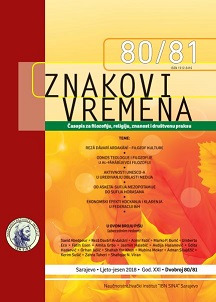Od asketa-sufija Mezopotamije do sufija Horasana
From Ascetic Sufis of Mesopotamia to Sufis of Khorasan
Author(s): Zahra TaheriSubject(s): Gender Studies, Social Philosophy, Islam studies, Philosophy of Religion, Hermeneutics, Sociology of Religion
Published by: Naučnoistraživački institut »Ibn Sina«
Keywords: Women; rights of women; Islam; Islam culture; Islamic society; Qur’an;
Summary/Abstract: The question of the personality of women and their rights in Islam is one of the issues that the researchers of Islamic history and culture have been most concerned with over the past few decades. The general beliefs about the right of women in Islam that demonstrated the lack of awareness of the position and role of the woman that the Qur’an intended for her, has led to the emergence of general theories in the West about how a Muslim woman in a course of history was exposed to the violence of Islamic law and that she had never had any role in the scientific and cultural field. Extensive research on the rights of women in Islam over recent decades shows that Islam – and based on the principle of equality between women and men – has granted when it comes to creation, belief, reward and punishment and in many other cases of fundamental human rights, much greater rights to a woman and intended for her a higher position in relation to earlier religions. But bearing in mind the fact that the history of human societies in general, not only Islamic, has gone through a very long period of patriarchy, and that, as is normal, the primacy in writing was held by men, Islamic teaching - as well as teaching of other religions – in many cases related to women, have given a distorted perception and after the first centuries of Islam, banned her presence on the social scene. Although the proportion of women who built and promoted Islamic culture compared to men was almost insignificant, throughout Islamic history there have been still visible signs of, sometimes open, sometimes disguised, presence of women-scholars, mujtahidas, sufis, transmitters of hadith, commentators of the Qur’an. Since it depended on men – the authors of the tafsir – whether or not these women will be mentioned in their works (usually their names have been left out), there still remained testimonies of the significant presence of women in their communities in the time they lived, and on the basis of which can, to a certain extent, their social position can be assessed.
Journal: Znakovi vremena - Časopis za filozofiju, religiju, znanost i društvenu praksu
- Issue Year: XXI/2018
- Issue No: 80/81
- Page Range: 195-209
- Page Count: 15
- Language: Bosnian

